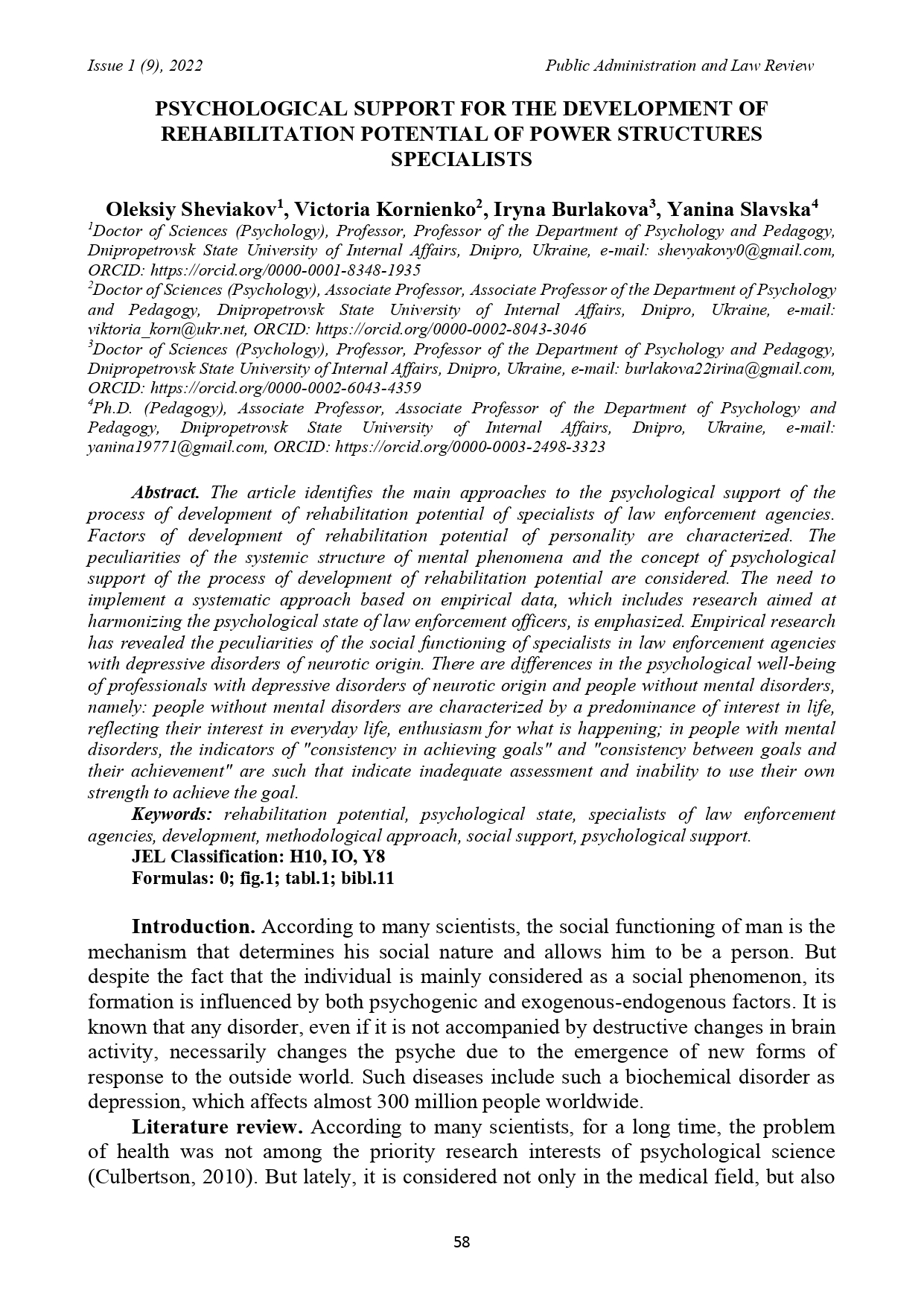Psychological support for the development of rehabilitation potential of power structures specialists
DOI:
https://doi.org/10.36690/2674-5216-2022-1-57Keywords:
psychological rehabilitation, power structures, resilience, life satisfaction, neurotic disorders, social functioning, self-esteem, stress managementAbstract
The increasing demands on specialists in power structures, including military, law enforcement, and emergency services, require the development of a robust system of psychological support. These professionals face high-stress environments, which often lead to physical, emotional, and psychological challenges that impair their operational effectiveness. This study focuses on establishing a comprehensive system of psychological support to enhance the rehabilitation potential of these specialists, enabling recovery, adaptability, and sustained professional performance. Rehabilitation potential is conceptualized as an individual’s ability to recover and maintain effectiveness amidst adverse circumstances, emphasizing the need for integrated psychological diagnostics, interventions, and support. The study aims to develop a conceptual framework and practical approaches for enhancing the psychological rehabilitation potential of specialists within power structures. The study involved 175 participants, comprising 91 specialists diagnosed with depressive disorders of neurotic origin and 84 individuals without diagnosed mental disorders. A mixed-methods approach was employed, integrating the following: I. Karler Questionnaire; Life Satisfaction Index, adapted by N. Panina; Statistical Analysis Tools. The study identified key areas of dissatisfaction and psychological trauma in both groups, focusing on interpersonal, professional, and social domains. The findings underscore the importance of addressing personal, professional, and social factors in psychological rehabilitation. Normative benchmarks, including high levels of life satisfaction, resilience, and self-confidence, were identified among individuals without mental disorders. These benchmarks serve as goals for rehabilitation interventions.
Downloads
References
Adler, A. B., Bliese, P. D., McGurk, D., Hoge, C. W., & Castro, C. A. (2011). Battlemind debriefing and battlemind training as early interventions with soldiers returning from Iraq: Randomization by platoon. Journal of Consulting and Clinical Psychology, 77(5), 928–940. https://doi.org/10.1037/a0014197
Bengel, J. (2018). Education, advanced and further training in the field psychology in rehabilitation. Rehabilitation (Stuttg), 53(2), 124–130.
Bennabi, D. (2015). Risk factors for treatment resistance in unipolar depression: A systematic review. Journal of Affective Disorders, 171, 137–141. https://doi.org/10.1016/j.jad.2014.09.020
Bohlmeijer, E., & Hulsbergen, M. (2011). Efficacy of an early intervention based on acceptance and commitment therapy for adults with depressive symptomatology: Evaluation in a randomized controlled trial. Behaviour Research and Therapy, 49(1), 62–67. https://doi.org/10.1016/j.brat.2010.11.007
Britt, T. W., McFadden, A. C., & Moore, D. M. (2016). Resilience in the workplace: Understanding stress and coping mechanisms in high-stakes professions. Military Psychology, 28(3), 176–189. https://doi.org/10.1037/mil0000096
Burlakova, I., Sheviakov, O., & Kondes, T. (2021). PSYCHOLOGICAL PREDICTORS OF THE FORMATION OF HEALTH-PRESERVING COMPETENTNESS OF FUTURE SPECIALISTS. Public Administration and Law Review, (4), 74–79. https://doi.org/10.36690/2674-5216-2021-4-74
Caza, A. (2010). Psychological capital and authentic leadership. Asia-Pacific Journal of Business Administration, 2(1), 53–70.
Christian, A. (2011). Coping style as a mediator of the relationship between depressive symptoms and deliberate self-harm. Crisis, 32(5), 272–279.
Chung, J. (2018). Relationships among resilience, self-esteem, and depressive symptoms in Chinese adolescents. Journal of Health Psychology, 19(1), 13–59.
Constand, M. K., MacDermid, J. C., & Law, M. (2014). Scoping review of patient-centered care approaches in healthcare. BMC Health Services Research, 14(1), 271–272. https://doi.org/10.1186/1472-6963-14-271
Coventry, P., Lovell, K., Dickens, C., & Bower, P. (2015). Integrated primary care for patients with mental and physical multimorbidity: Cluster randomised controlled trial of collaborative care for patients with depression comorbid with diabetes or cardiovascular disease. BMJ, 350, h638. https://doi.org/10.1136/bmj.h638
Culbertson, S., & Fullagar, C. (2010). Feeling good and doing great: The relationship between psychological capital and well-being. Journal of Occupational Health Psychology, 15(4), 421–433. https://doi.org/10.1037/a0020720
Hoge, C. W., Auchterlonie, J. L., & Milliken, C. S. (2004). Mental health problems, use of mental health services, and attrition from military service after returning from deployment to Iraq or Afghanistan. JAMA, 295(9), 1023–1032. https://doi.org/10.1001/jama.295.9.1023
Kuremyr, D., Olsson, K., & Johansson, C. (2020). Organizational support and peer networks as critical factors for resilience in law enforcement officers. Journal of Police and Criminal Psychology, 35(2), 123–134. https://doi.org/10.1007/s11896-019-09340-4
McCreary, D. R., & Thompson, M. M. (2006). Development of two reliable and valid measures of stressors in policing: The operational and organizational police stress questionnaires. International Journal of Stress Management, 13(4), 494–518. https://doi.org/10.1037/1072-5245.13.4.494
Meichenbaum, D. (2007). Stress inoculation training: A preventative and therapeutic approach. Springer.
Van der Kolk, B. A. (2014). The body keeps the score: Brain, mind, and body in the healing of trauma. Viking Press.

Downloads
Published
How to Cite
Issue
Section
License
Copyright (c) 2022 “Scientific Center of Innovative Researches” OÜ

This work is licensed under a Creative Commons Attribution-NonCommercial-NoDerivatives 4.0 International License.





